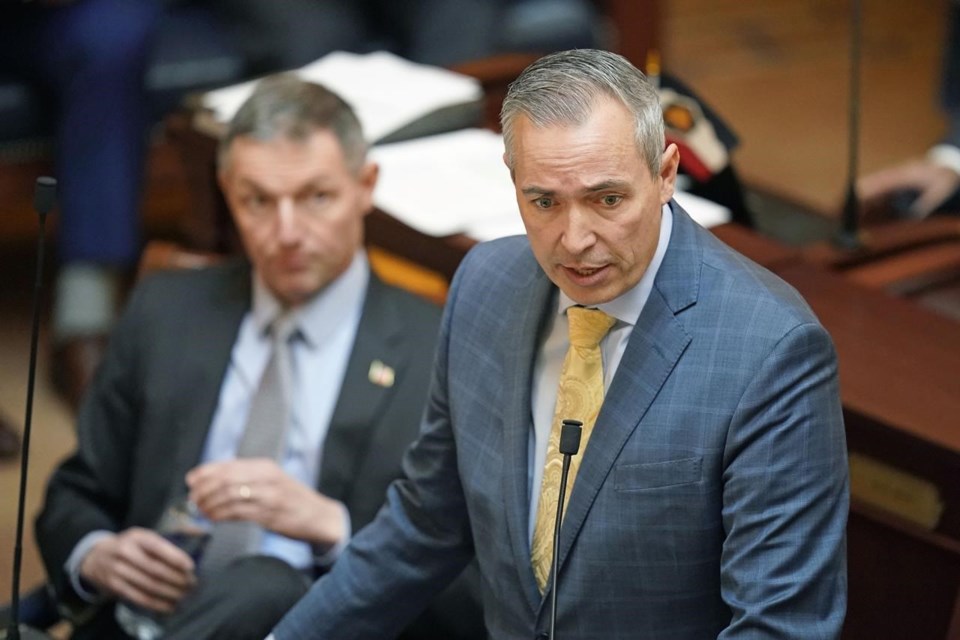SALT LAKE CITY (AP) — Lawmakers advanced a measure to limit where people can get abortions in Utah, banning abortion clinics and effectively requiring they only be provided in hospitals. After passing through the state Senate on a party-line vote Thursday, it will return to the state House of Representatives for voting on minor amendments and then head to the desk of Gov. Spencer Cox, an anti-abortion Republican who expressed support last month.
“When we passed the trigger ban a couple years ago, I did not anticipate we would be here so soon,” Republican state Sen. Dan McCay said.
The measure is one of several that members of Utah's Republican-supermajority statehouse has passed this year while abortion restrictions approved in years past are on hold due to a state court injunction. It has faced fierce opposition from business, civil liberties and abortion rights groups including Planned Parenthood Association of Utah, which operates three of the four abortion clinics in the state.
“It has one goal," Karrie Galloway, the group's president and CEO, said in a statement after the measure passed. “Put abortion out of reach for as many Utahns as possible no matter what their faith, family and trust medical providers decide is best for their safety and health.”
Republican lawmakers' push to shutter abortion clinics comes as red states throughout the country work to implement restrictions less than a year after the overturning of Roe v. Wade, the U.S. Supreme Court decision that enshrined a constitutional right to abortion for nearly 50 years. After the court gave states the power to regulate abortion, many attempted to implement “trigger laws” designed to take effect upon a Supreme Court ruling, while others took action to reinstitute pre-Roe bans on the books.
In Utah, the ruling triggered two previously passed laws — a 2019 ban on abortion after 18 weeks and a 2020 ban on abortions regardless of trimester, with several exceptions including for instances of risk to maternal health as well as rape or incest reported to the police. The state Planned Parenthood affiliate sued over the 2020 ban, and in July, a state court delayed implementing it until legal challenges could be resolved. The 18-week ban has since been de facto law.
The clinic-centered push in Utah is unique among states with trigger laws, where many abortion clinics closed after last year's Supreme Court decision. Clinics were shuttered in states such as West Virginia and Mississippi in the aftermath, yet they remain open in Utah while courts deliberate. The measure mirrors a raft of proposals passed in red states in the decade before Roe was overturned when anti-abortion lawmakers passed measuresregulating clinics, including the size of procedure rooms and distances from hospitals.
In Utah, the proposal from Rep. Karianne Lisonbee would require all abortions — via medication or surgery — be provided in hospitals by not allowing new clinics to be licensed after May 2 and not allowing any to operate once their licenses expire. It would affect the operations of the four clinics that provide abortions in Utah — three run by Planned Parenthood and the other by Wasatch Women's Center, an independent clinic in Salt Lake City. The measure would also clarify the definition of abortion to address legal liability concerns providers voiced about the way exceptions are worded in state law — a provision Republicans called a compromise.
Because the 2020 ban would effectively put abortion clinics out of business, abortion opponents argue that it makes sense to remove them from state statute, Mary Taylor, president of Pro-Life Utah, said. She said the exceptional circumstances in which abortion will still be legal — rape, incest and health of the mother — are better suited to hospital care.
“We have in statute provisions to license an abortion clinic when abortion is not legal. There’s an incongruency there,” Taylor said. “This just clarifies the statute.”
McCay, the measure's Senate sponsor, said limiting abortions to emergency or exceptional circumstances and requiring they be provided in hospitals would protect both “the innocent and the health of the mother."
In Utah last year, clinics provided most abortions. Of the total 2,818 administered, 61% were with medications like mifepristone rather than via surgery. Abortion access proponents argued abortions were no different than other kinds of specialty care that have increasingly moved to clinic settings where providers are more accustomed to recurring patient concerns and confronting complications that may arise.
Jasmin Charles, a Salt Lake City physician's assistant, said closing clinics would limit access to anyone seeking an abortion but would make things especially difficult for people who may not have extra cash or easy access to transportation. She anticipated difficult conversations lied ahead with her patients, including those struggling with substance abuse, as she works to advise them on how to access a rapidly diminishing number of reproductive health care options.
“I can tell my patients that hospitals are OK,” Charles said. “But I know I work with individuals who cannot access the care through the hospital when every time they walk through the hospital door — including for an abortion — they think ‘It’ll cost me $10,000 to $20,000.'”
__
This story has been updated to correct that the measure must return to the Utah House of Representatives for voting on minor amendments before heading to Gov. Spencer Cox for approval, not head straight to the governor.
Sam Metz, The Associated Press



